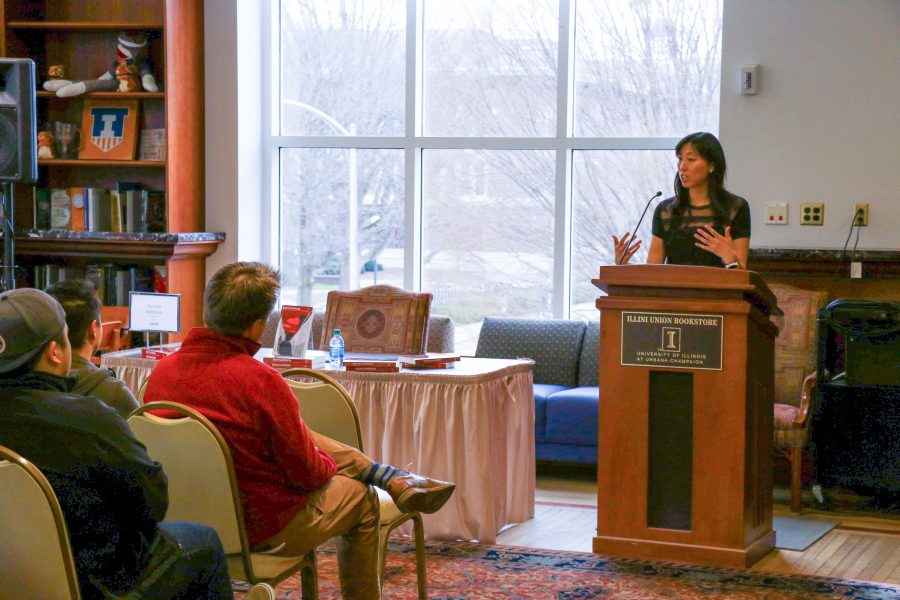University professor tackles “rightlessness” in America
Dr. A Naomi Paik gives a talk about her book “Rightlessness” at the Illini Union Bookstore on Mar. 28.
Apr 5, 2017
Force feedings, hunger strikes and suicides. The history of prison camps in the U.S. have subjected people to a loss of legal and civil rights, as well as isolation from the social community.
“That’s rightlessness”, said Angela Naomi Paik, assistant professor in the Asian-American studies department.
In 2003, shortly after the Guantanamo Bay Detention Camp opened, Paik began to question what was happening in the camp and how it was possible. Paik was a graduate student at Yale at the time and later received her Ph.D. in American Studies.
Paik wanted to understand how, historically, a prison camp like Guantanamo Bay could exist and what she could do about it.
To find the answer to her question, Paik began research for her dissertation in 2006, which was published as a book in April 2016, “Rightlessness.”
Get The Daily Illini in your inbox!
In reading an excerpt from her book, Paik said: “We need to hear the call from the rightless, not only for their sake, but for ours as well. We need to hear the call of the rightless because they know what the future holds.”
To start her research, Paik decided to “work backwards” and look at history. The first precedent Paik researched was the Haitian coup d’état in the 1990s. Thousands of Haitian refugees attempted to escape political conflict but were either captured and sent back or taken to the refugee camp at Guantanamo by the U.S.
In a small, disorganized room, Paik looked through stacked papers of archives and legal and press documents to learn more about the Haitian case.
“I looked at every single piece of paper in there,” Paik said. “The thing that I looked for first was refugee testimonies because I’m really interested in what the people in the camp have to say.”
Through her research, Paik learned the refugees were being detained indefinitely.
Paik’s research of the Haitian coup d’état led her to seek information on Japanese Internment camps in the U.S. during World War II.
Paik read an excerpt from her book and held a discussion at the Illini Union Bookstore last week.
The book focuses on Japanese internment camps, Haitian refugees and so-called enemy combatants held at Guantanamo Bay.
“You have to listen. We need to pay attention to the testimonies of the imprisoned because they know more about this condition than anyone else will,” Paik said. “They are the real experts on what it means to be rightless and what it means to be deprived of these fundamental protections.”
Yiyi Wang, sophomore in LAS, attended the event for her class, where they study the representation of Asian-Americans in pop culture through media, history and orientalism.
“We have learned about the Japanese internment and how people have rationalized it through different ideologies,” Wong said. “I think the way that she addressed the rightlessness versus (having) the rights is really interesting how it radicalizes the Japanese.”
Christopher Eng, professor of Asian-American studies, teaches a class on pop culture.
He said in an email that his course is a way to look at how pop culture shapes our understanding about Asian-American relationships to the notions of American national belonging and cultural citizenship.
The course studies the Chinese Exclusion Act and the internment camps during World War II. It looks into the internment camps’ relation to the rationalization of anti-Asian legal measures when studying racist depictions in pop culture.
“Paik invites us to consider how the realm of popular culture is not tangential, but central to the creation of rightlessness insofar it works to justify or normalize these gross acts of injustice that are carried out routinely by our government,” Eng wrote.
As for the solution that Paik sought through her research, she said political participation amongst people is what can enact “true democratic politics.”
Paik sees parallels between the precedents and the current political atmosphere, with the escalation of the war on terror, bombings, Iraq, Yemen, martial rhetoric and the criminalization of immigrant communities.
“If we look at the executive orders that have come out of the White House since January, we see a lot more about immigration enforcement,” Paik said. “We see things about escalating law and order principles and criminalization of already criminalized communities and of immigrant communities … to me this is the enactment and spread of rightlessness.”
Paik said these occurrences in American politics are “not new” and are simply an escalation that has the potential to spread to more people.
“I really do think that it’s going to spread to people who feel themselves to be very safe from these kinds of forces like the criminalization of mass assembly or protest,” Paik said. “That’s a fundamental right. You know to say that we disagree with something. To criminalize that, to throw you in jail for that, is really incredibly dangerous to our democracy.”






